- Home
- William Gibson
Idoru Page 2
Idoru Read online
Page 2
“First you tell me whether or not you're from Paragon-Asia,” Laney suggested.
“Firm in question's a couple of lines of code in a machine in a backroom in Lygon Street,” Blackwell said. “A dummy, but you could say it's our dummy, if that makes you feel better.”
“I'm not sure it does,” Laney said. “You fly me over to interview for a job, now you're telling me the company I'm supposed to be interviewing for doesn't exist.”
“It exists,” said Keith Alan Blackwell. “It's on the machine in Lygon Street.”
A waitress arrived. She wore a shapeless gray cotton boilersuit and cosmetic bruises.
“Big draft. Kirin. Cold one. What's yours, Laney?”
“Iced coffee.”
“Coke Lite, please,” said the one who'd introduced himself as Yamazaki.
“Fine,” said the earless Blackwell, glumly, as the waitress vanished into the gloom.
“I'd appreciate it if you could explain to me what we're doing here,” Laney said. He saw that Yamazaki was scribbling frantically on the screen of a small notebook, the lightpen flashing faintly in the dark. “Are you taking this down?” Laney asked.
“Sorry, no. Making note of waitress' costume.”
“Why?” Laney asked.
“Sorry,” said Yamazaki, saving what he'd written and turning off the notebook. He tucked the pen carefully into a recess on the side. “I am a student of such things. It is my habit to record ephemera of popular culture. Her costume raises the question: does it merely reflect the theme of this club, or does it represent some deeper response to trauma of earthquake and subsequent reconstruction?”
2. Lo Rez Skyline
They met in a jungle clearing.
Kelsey had done the vegetation: big bright Rousseau leaves, cartoon orchids flecked with her idea of tropical colors (which reminded Chia of that mall chain that sold “organic” cosmetic products in shades utterly unknown to nature). Zona, the only one telepresent who'd ever seen anything like a real jungle, had done the audio, providing birdcalls, invisible but realistically dopplering bugs, and the odd vegetational rustle artfully suggesting not snakes but some shy furry thing, soft-pawed and curious.
The light, such as there was, filtered down through high, green canopies, entirely too Disneyesque for Chia—though there was no real need for “light” in a place that consisted of nothing else.
Zona, her blue Aztec death's-head burning bodiless, ghosts of her blue hands flickering like strobe-lit doves: “Clearly, this dickless whore, the disembodied, has contrived to ensnare his soul.” Stylized lightning zig-zags rose around the crown of the neon skull in deliberate emphasis.
Chia wondered what she'd really said. Was “dickless whore” an artifact of instantaneous on-line translation, or was that really something you could or would say in Mexican?
“Waiting hard con-firm from Tokyo chapter,” Kelsey reminded them. Kelsey's father was a Houston tax lawyer, something of his particular species of biz-speak tending to enter his daughter around meeting time; also a certain ability to wait that Chia found irritating, particularly as manifested by a saucer-eyed nymph-figure out of some old anime. Which Chia was double damn sure Kelsey would not look like realtime, were they ever to meet that way. (Chia herself was presenting currently as an only slightly tweaked, she felt, version of how the mirror told her she actually looked. Less nose, maybe. Lips a little fuller. But that was it. Almost.)
“Exactly,” Zona said, miniature stone calendars whirling angrily in her eye-holes. “We wait. While he moves ever closer to his fate. We wait. If my girls and I were to wait like this, the Rats would sweep us from the avenues.” Zona was, she claimed, the leader of a knife-packing chilanga girl gang. Not the meanest in Mexico City, maybe, but serious enough about turf and tribute. Chia wasn't sure she believed it, but it made for some interesting attitude in meetings.
“Really?” Kelsey drew her nymph-self up with elvin dignity, batting manga-doe lashes in disbelief. “In that case, Zona Rosa, why don't you just get yourself over to Tokyo and find out what's really going on? I mean, did Rez say that, that he was going to marry her, or what? And while you're at it, find out whether she exists or not, okay?”
The calendars stopped on a dime.
The blue hands vanished.
The skull seemed to recede some infinite distance yet remain perfectly in focus, clear in every textural detail.
Old trick, Chia thought. Stalling.
“You know that I cannot do that,” Zona said. “I have responsibilities here. Maria Conchita, the Rat warlord, has stated that—”
“As if we care, right?” Kelsey launched herself straight up, her nymphness a pale blur against the rising tangle of green, until she hovered just below the canopy, a beam of sunlight flattering one impossible cheekbone. “Zona Rosa's full of shit!” she bellowed, not at all nymphlike.
“Don't fight,” Chia said. “This is important. Please.”
Kelsey descended, instantly. “Then you go,” she said.
“Me?”
“You,” Kelsey said.
“I can't,” Chia said. “To Tokyo? How could I?”
“In an airplane.”
“We don't have your kind of money, Kelsey.”
“You've got a passport. We know you do. Your mother had to get one for you when she was doing the custody thing. And we know that you are, to put it delicately, ‘between schools,’ yes?”
“Yes—”
“Then what's the prob?”
“Your father's a big tax lawyer!”
“I know,” Kelsey said. “And he flies back and forth, all over the world, making money. But you know what else he earns, Chia?”
“What?”
“Frequent-flyer points. Big-ass frequent-flyer points. On Air Magellan.”
“Interesting,” said the Aztec skull.
“Tokyo,” said the mean nymph.
Shit, Chia thought.
The wall opposite Chia's bed was decorated with a six-by-six laser blowup of the cover of Lo Rez Skyline, their first album. Not the one you got if you bought it today, but the original, the group shot they'd done for that crucial first release on the indie Dog Soup label. She'd pulled the file off the club's site the week she'd joined, found a place near the Market that could print it out that big. It was still her favorite, and not just, as her mother too frequently suggested, because they all still looked so young. Her mother didn't like that the members of Lo/Rez were nearly as old as she was. Why wasn't Chia into music by people her own age?
—Please, mother, who?
—That Chrome Koran, say.
—Gag, mother.
Chia suspected that her mother's perception of time differed from her own in radical and mysterious ways. Not just in the way that a month, to Chia's mother, was not a very long time, but in the way that her mother's “now” was such a narrow and literal thing. News-governed, Chia believed. Cable-fed. A present honed to whatever very instant of a helicopter traffic report.
Chia's “now” was digital, effortlessly elastic, instant recall supported by global systems she'd never have to bother comprehending.
Lo Rez Skyline had been released, if you could call it that, a week (well, six days) before Chia had been born. She estimated that no hard copies would have reached Seattle in time for her nativity, but she liked to believe there had been listeners here even then, PacRim visionaries netting new sounds from indies as obscure, even, as East Teipei's Dog Soup. Surely the opening chords of “Positron Premonition” had shoved molecules of actual Seattle air, somewhere, in somebody's basement room, at the fateful moment of her birth. She knew that, somehow, just as she knew that “Stuck Pixel,” barely even a song, just Lo noodling around on some pawnshop guitar, must have been playing somewhere when her mother, who'd spoken very little English at that point, chose Chia's name from something cycling past on the Shopping Channel, the phonetic caress of those syllables striking her there in Postnatal Recovery as some optimally gentle combination of soun
ds Italian and English; her baby, red-haired even then, subsequently christened Chia Pet McKenzie (somewhat, Chia later gathered, to the amazement of her absent Canadian father).
These thoughts arriving in the pre-alarm dark, just before the infrared winkie on her alarm clock stuttered silently to the halogen gallery-spot, telling it to illuminate Lo/Rez in all their Dog Soup glory. Rez with his shirt open (but entirely ironically) and Lo with his grin and a prototype mustache that hadn't quite grown in.
Hi, guys. Fumbling for her remote. Zapping infrared into the shadows. Zap: Espressomatic. Zap: cubic space heater.
Beneath her pillow the unfamiliar shape of her passport, like a vintage game cartridge, hard navy blue plastic, textured like leatherette, with its stamped gold seal and eagle. The Air Magellan tickets in their limp beige plastic folder from the travel agent in the mall.
Going now.
She took a deep breath. Her mother's house seemed to take one as well, but more tentatively, its wooden bones creaking in the winter morning cold.
The cab arriving as scheduled, but magically nonetheless, and no, it didn't honk, exactly as requested. Kelsey having explained how these things were done. Just as Kelsey, briskly interviewing Chia on the circumstances of her life, had devised the cover for her impending absence: ten days in the San Juans with Hester Chen, whose well-heeled luddite mother so thoroughly feared electromagnetic radiation that she lived phoneless, in a sod-roofed castle of driftwood, no electricity allowed whatever. “Tell her you're doing a media fast, before your new school thing comes together,” Kelsey had said. “She'll like that.” And Chia's mother, who felt that Chia spent entirely too much time gloved and goggled, did.
Chia was actually fond of the gentle Hester, who seemed to get what Lo/Rez were about, though somehow without being quite as fundamentally moved as could have been expected, and Chia had in fact already tried the pleasures of Mrs. Chen's island retreat. But Hester's mother had made them both wear special baseball caps, sewn from some EMR-proof fabric, so that their young brains might not be bathed quite so constantly in the invisible soup of bad media.
Chia had complained to Hester that the caps made them both look like meshbacks.
—Don't be racist, Chia.
—I'm not.
—Classist, then.
—It's a matter of aesthetics.
And now in the overheated cab, her one bag beside her on the seat, she felt guilt at this deception, her mother sleeping there behind those darkened windows matted with frost, under the weight of her thirty-five years and the flowered duvet Chia had bought at Nordstrom's. When Chia had been small, her mother had worn her hair in a long braid, its tip skewered with turquoise and abalone and carved bits of bone, like the magical tail of some mythical animal, swaying there for Chia to grab. And the house looked sad, too, as if it regretted her leaving, white paint peeling from the underlying gray of ninety-year-old cedar clapboards. Chia shivered. What if she never came back?
“Where to?” the driver said, a black man in a puffy nylon jacket and a flat plaid cap.
“Sea Tac,” Chia said, and pushed her shoulders back into the seat.
Pulling out past the old Lexus the neighbors kept up on concrete blocks in the driveway.
Airports were spooky places, early in the morning. There was a hollowness that could settle on you there, something sad and empty. Corridors and people moving away down them. Standing in line behind people she'd never seen before and would never see again. Her bag over her shoulder and her passport and ticket in her hand. She wanted another cup of coffee. There was one back in her room, in the Espressomatic. Which she should've emptied and cleaned, because now it would go moldy while she was away.
“Yes?” The man behind the counter wore a striped shirt, a tie with the Air Magellan logo repeated down it diagonally, and a green jade labret stud. Chia wondered what his lower lip looked like when he took it out. She never would, she decided, if she had one of those. She handed him her ticket. He sighed and removed them from the folder, letting her know that she should've done that herself.
She watched him run a scanner over her ticket.
“Air Magellan one-oh-five to Narita, economy return.”
“That's right,” Chia said, trying to be helpful. He didn't seem to appreciate that.
“Travel document.”
Chia handed him her passport. He looked at it as though he'd never seen one before, sighed, and plugged it into a slot in the top of his counter. The slot had beat-up aluminum lips, and someone had covered these with transparent tape, peeling now and dirty. The man was looking at a monitor Chia couldn't see. Maybe he was going to tell her she couldn't go. She thought about the coffee in her Espressomatic. It would still be warm.
“Twenty-three D,” he said, as a boarding-pass spooled from a different slot. He pulled her passport out and handed it to her, along with her ticket and the boarding pass. “Gate fifty-two, blue concourse. Checking anything?”
“No.”
“Passengers who've cleared security may be subject to noninvasive DNA sampling,” he said, the words all run together because he was only saying it because it was the law that he had to.
She put her passport and ticket away in the special pocket inside her parka. She kept the boarding pass in her hand. She went looking for the blue concourse. She had to go downstairs to find it, and take one of those trains that was like an elevator that ran sideways. Half an hour later she was through security, looking at the seals they'd put on the zippers of her carry-on. They looked like rings of rubbery red candy. She hadn't expected them to do that; she'd thought she could find a pay-station in the departure lounge, link up, and give the club an update. They never sealed her carry-on when she went to Vancouver to stay with her uncle, but that wasn't really international, not since the Agreement.
She was riding a rubber sidewalk toward Gate 52 when she saw the blue light flashing, up ahead. Soldiers there, and a little barricade. The soldiers were lining people up as they came off the sidewalk. They wore fatigues and didn't seem to be much older than the guys at her last school.
“Shit,” she heard the woman in front of her say, a big-haired blond with obvious extensions woven in. Big red lips, multilevel mascara, padded shoulders out to here, tiny little skirt, white cowboy boots. Like that country singer her mother liked, Ashleigh Modine Carter. Kind of a meshback thing, but with money.
Chia stepped off the end of the rubber sidewalk and took her place in line behind the woman who looked like Ashleigh Modine Carter.
The soldiers were taking hair samples and slotting people's passports. Chia assumed that was to prove you really were who you said you were, because your DNA was there in your passport, converted into a kind of bar code.
The sampler was a little silver wand that vacuumed the tips of a couple of strands in and clipped them off. They'd wind up with the world's biggest collection of split ends, Chia thought. Now it was the blond's turn. There were two boy-soldiers there, one to work the sampler and one to rattle off the line about how you'd already agreed to this by coming this far, and please produce your passport.
Chia watched as the woman handed over her passport, becoming somehow instantly and up-front sexy, like a lightbulb coming on, with a big smile for the soldier that made him blink and swallow and nearly drop the passport. Grinning, he stuck the passport into a little console attached to the barricade. The other soldier raised his wand. Chia saw the woman reach up and choose one of her hair-extensions, offering the end of this for sampling. The whole thing taking maybe eight seconds, including the return of her passport, and the first soldier was still smiling now that it was Chia's turn.
The woman moved on, having just committed what Chia felt fairly certain would be a federal offense. Should she tell the soldier?
But she didn't, and then they were handing back her passport and Chia was on her way to Gate 53. Where she looked for the woman but didn't see her.
She watched the ads cycle by on the walls, until they wer
e called to board by rows.
Seat 23E remained empty as Chia waited for takeoff, sucking on a peppermint the flight attendant had given her. The only empty seat on the plane, she figured. If nobody arrived to take it, she thought, she'd be able to fold the armrest away and curl up there. She tried putting out a negative mental field, a vibe that would keep anyone from getting on at the last minute and sitting there. Zona Rosa was into that, part of her whole girl-gang martial arts thing. Chia didn't see how you could seriously believe it would work.
And it didn't, because here came that blond down the aisle, and wasn't that an eye-click of recognition Chia saw there?
3. Almost a Civilian
It had been a weeknight, a Wednesday, when Laney had last seen Kathy Torrance, and her tattoo had not been visible. She'd stood there in the Cage, screaming as he cleaned out his locker. She was wearing an Armani blazer cut from gun-metal fustian, its matching skirt concealing the sign from outer space. A single strand of pearls was visible at the open throat of her white, man-tailored blouse. Her dress uniform. Called on the carpet for her subordinate's defection.
He knew that she was screaming because her mouth was open, but the syllables of her rage couldn't penetrate the seamless hissing surf of the white-noise generator provided by his lawyers. He'd been advised to wear the generator at all times, during this last visit to the Slitscan offices. He'd been instructed to make no statements. Certainly he would hear none.
And later he would sometimes wonder exactly how she might have framed her fury. Some restatement of her theory of celebrity and the nature of its price, of Slitscan's place in that, of Laney's inability to function there? Or would she have focused on his treason? But he hadn't heard; he'd only put these things he didn't really want into a corrugated plastic carton that still smelled faintly of Mexican oranges. The notebook, screen cracked now, useless, that he'd carried through college. Insulated mug with the Nissan County logo peeling away. Notes he'd made on paper, counter to office policy. A coffee-stained fax from a woman he'd slept with in Ixtapa, someone whose initials couldn't be deciphered now and whose name he'd forgotten. Pointless pieces of the self, destined for a cannister in the building's parking lot. But he'd leave nothing here, and Kathy kept on screaming.

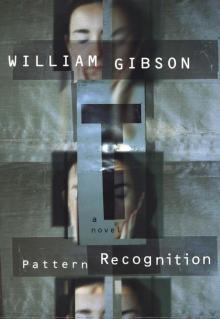 Pattern Recognition
Pattern Recognition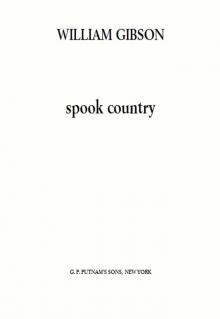 Spook Country
Spook Country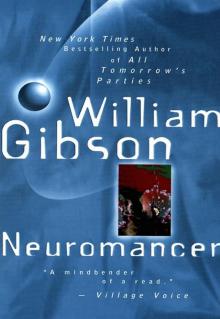 Neuromancer
Neuromancer Skinner's Room
Skinner's Room The Difference Engine
The Difference Engine Mona Lisa Overdrive
Mona Lisa Overdrive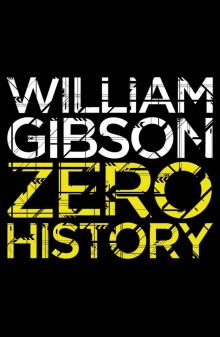 Zero History
Zero History The Peripheral
The Peripheral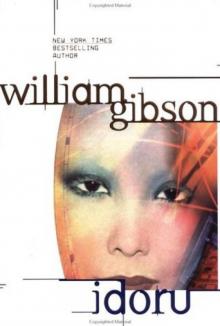 Idoru
Idoru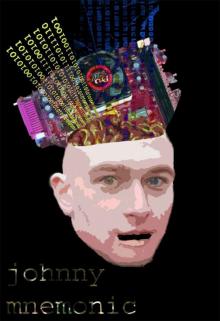 Johnny Mnemonic
Johnny Mnemonic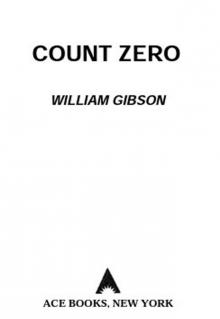 Count Zero
Count Zero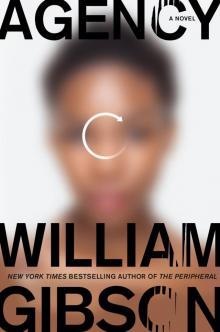 Agency
Agency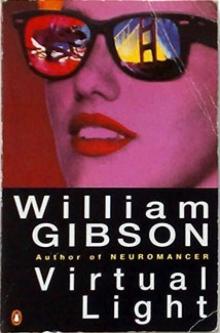 Virtual Light
Virtual Light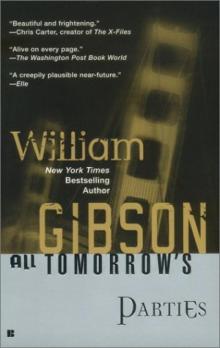 All Tomorrow's Parties
All Tomorrow's Parties The Miracle Worker
The Miracle Worker Disneyland with the Death Penalty
Disneyland with the Death Penalty Idoru tb-2
Idoru tb-2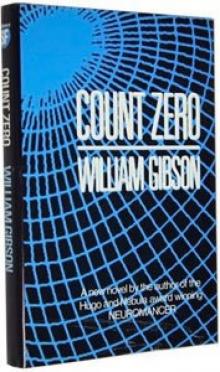 Count Zero s-2
Count Zero s-2 The Gernsback Continuum
The Gernsback Continuum New Rose hotel (tales)
New Rose hotel (tales)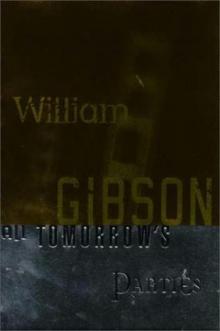 All Tomorrow's Parties bt-3
All Tomorrow's Parties bt-3 Hinterlands
Hinterlands Thirteen Views Of A Cardboard City
Thirteen Views Of A Cardboard City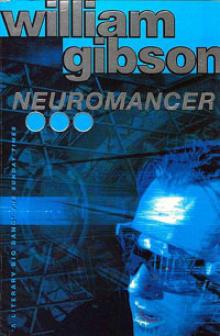 Neuromancer ts-1
Neuromancer ts-1 Virtual light b-1
Virtual light b-1